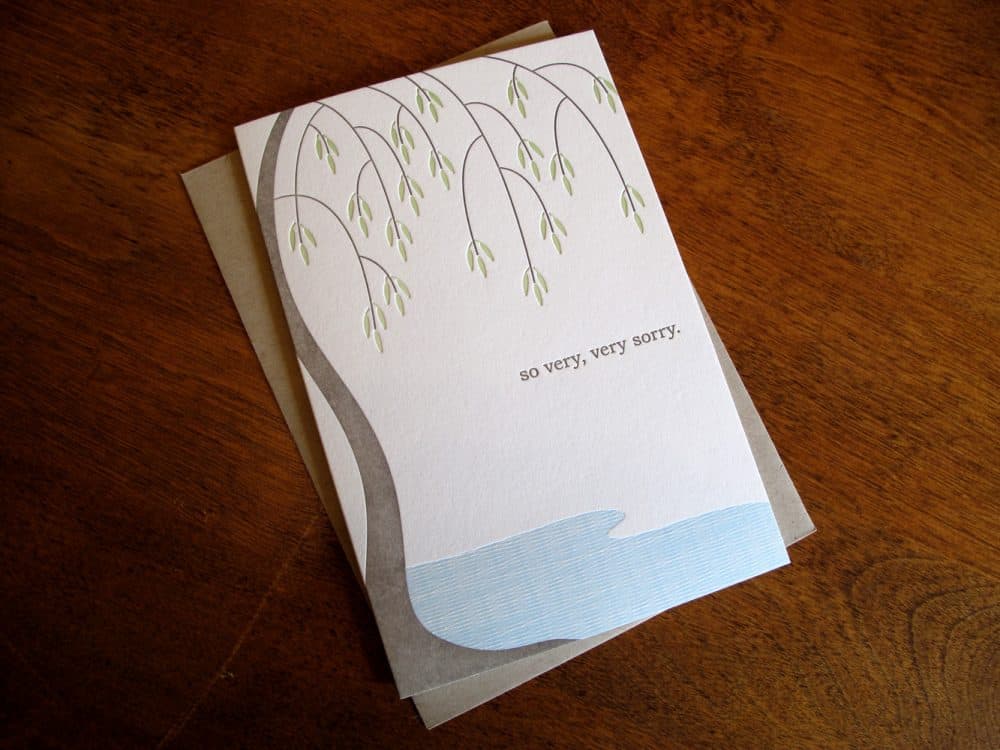Advertisement
Heavy Meddle: Why Can’t I Offer Condolences?

Welcome Meddleheads, to the advice column where your crazy meets my crazy! Please send your questions. You can use this form, or send them via email. Not only will you immediately feel much better, you’ll also get some advice.
Hugs,
Steve
...
Dear Steve,
I tend to be good with words, with one notable exception: I struggle to find the right thing to say when news comes that someone has died. I'm ashamed to admit that my awkwardness around offering condolences has led me, in the past, to scrap the drafts of condolence notes I've attempted and remain silent, hoping that, somehow, my sorrow for someone’s loss is understood. Believe me, I know this is lame. I'm not proud of it. (I'm also pretty lousy when trying to find the right thing to say to someone who is ill or who has a family member who is.)
I am determined to change this about myself. The time is now. Recently, a close neighbor's husband died. We'd been guests in their home, hosted them in ours. We've shared vacation photographs and funny family stories. Because of the proximity of our apartment buildings, I've seen them both in their underwear across the alley. I'm pretty sure they've seen us in ours, too. We have been very fond of this family, the first to greet us when we were new to the neighborhood. We've watered their garden when they're away, and they've returned the favor. You get the idea; they have been more than neighbors; they have been friends.
She was staring into space, and I had the terrible thought that instead, she could be reading a note that offers her some kind of comfort, if only I could write it.
In the past few days, I have found myself hoping not to run into my neighbor, a grieving widow, out on the street in front of our apartments, where we both park. I fear that I'll burst into tears and burden her with my grief, whereas I should be trying to unburden her of hers. I have written a condolence note but not sent it, fearing that it's riddled with empty cliches. The truth is that news of her husband's death shook me deeply. I'm awash in a kind of sadness of my own, and just imagining her grief is terrible.
Last night, going around the apartment putting out lights before bed, I caught a glimpse of her on the floor of her husband's study, where I often saw him working. She was staring into space, and I had the terrible thought that instead, she could be reading a note that offers her some kind of comfort, if only I could write it.
Why this particular writer's block, Steve? And what is the right thing to say at times like these?
Advertisement
Blocked
...
Dear Blocked,
Trust me: you’re not alone. I struggle with the same feelings — of guilt, shame, inadequacy. So do most people. We understand intellectually that when someone dies it is our moral and cultural obligation to express sympathy. It feels like an obvious, instinctual gesture; the least you can do. What people tend to ignore (because it feels petty) is that the ritual of offering condolences is fraught with stage-fright.
When people endure misfortune on the scale of death — or serious illness, for that matter — we feel a chasm open up between ourselves and the surviving family. They have suffered something we haven’t. They are enduring unfathomable pain while we skate by on luck. What can we say that will undo this?
And the truth is — to be blunt — there is nothing you can say that will undo that kind of hurt. But that’s also not your job. Your job is just to offer a little support to someone who is suffering. Period.
In your case, you have the great advantage of having really liked this man who died, and his wife. It’s clear from your letter that they meant, and mean, a lot to you. And that’s all you have to tell your neighbor: that her husband was a special person, that you mourn his passing, and that you want to be there for her, if she wants to talk, or share a meal, or whatever.
There’s no formula, or formal etiquette, Blocked. There’s no grade. You don’t get points for being eloquent. You get points for being human.
If you’re worried about sounding platitudinous, then share some specific memories. Tell his widow just how much it meant to you and your husband that they welcomed you to the neighborhood. Share a few of those funny stories. You don’t have to tell your friend that you’ve seen her and her late husband in their underwear. But you have to be willing to get a little bit naked with your feelings — even (and especially) — because you’re grieving, too. As you note, you lost a good friend too.
There’s no formula, or formal etiquette, Blocked. There’s no grade. You don’t get points for being eloquent. You get points for being human.
So be a human. Write a note. Or find a time to visit. Or both.
And if you’re worried that offering condolences you might get you upset in the process, try not to fight it. A beloved figure has been taken from this world. Being upset is the appropriate reaction. Your neighbor shouldn’t have to shoulder the burden of this loss alone. And neither should you. So create a space where you can admit how much it hurts and help each other heal.
What you musn’t do is to turn this man’s death, and the suffering of your neighbor, into a self-punishing drama about your guilt and inadequacy. Instead, try to see this tragedy as a sad but inevitable occasion for humanity. Do what you can to express what’s in your heart. Forgive yourself the rest.
Steve
♥
Author's note: Okay, readers, your turn. What other advice would you offer to Blocked. Are there others who have felt this specific form of stage-fright? If so, what have you done to overcome it? Let her know in the comments section below. And feel free to send a letter to Heavy Meddle, too. You can use this form, or send your questions via email. I may not have a helpful response, but the act of writing the letter itself might provide some clarity. — S.A.
♥
Heavy Meddle with Steve Almond is Cognoscenti's advice column. Read more here.
